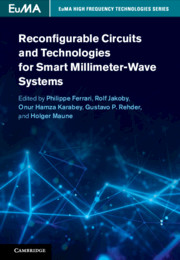Book contents
- Reconfigurable Circuits and Technologies for Smart Millimeter-Wave Systems
- EuMA High Frequency Technologies Series
- Reconfigurable Circuits and Technologies for Smart Millimeter-Wave Systems
- Copyright page
- Contents
- Contributors
- Preface
- Abbreviations
- 1 Introduction and Motivation
- 2 Reconfigurable Devices and Smart Antennas
- 3 CMOS and BiCMOS Technologies
- 4 RF MEMS Technology
- 5 Microwave Liquid Crystal Technology
- Book part
- Index
- References
4 - RF MEMS Technology
Published online by Cambridge University Press: 20 May 2022
- Reconfigurable Circuits and Technologies for Smart Millimeter-Wave Systems
- EuMA High Frequency Technologies Series
- Reconfigurable Circuits and Technologies for Smart Millimeter-Wave Systems
- Copyright page
- Contents
- Contributors
- Preface
- Abbreviations
- 1 Introduction and Motivation
- 2 Reconfigurable Devices and Smart Antennas
- 3 CMOS and BiCMOS Technologies
- 4 RF MEMS Technology
- 5 Microwave Liquid Crystal Technology
- Book part
- Index
- References
Summary
Several RF MEMS circuits were developed in the late 90s and early 2000s, showing low insertion loss, high linearity with low intermodulation and high power handling. Despite their superior behavior in many aspects, switching and tuning at microwave frequencies is mainly done by FET transistors, varactor diodes or MOS varactors, since their performance is acceptable and encapsulation costs are reduced. However, as the frequency increases into the millimeter wave range, their quality factor is considerably reduced and MEMS switches and varactors becomes a relevant option. In this chapter, the effect of the parasitics in the performance of the MEMS switch at millimeter wave frequencies is analyzed. Guidelines for the millimeter wave switch are presented. A literature review of the narrow-band and broadband switches , as well as phase shifters is also presented. The electromechanical behavior of RF MEMS switches and varactors has been covered extensively in the literature and will not be covered in this chapter.
Keywords
- Type
- Chapter
- Information
- Publisher: Cambridge University PressPrint publication year: 2022

